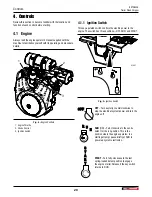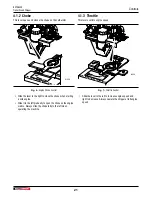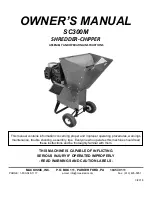
Safety
BXTR6438
Trailer Wood Chipper
Safety
10
•
Make sure tow vehicle is fitted with the correct size towing
ball.
•
Inspect all access panels and guards to ensure they are
secured.
•
Make sure fuel and hydraulic tank caps are on tight to
prevent spills while transporting.
•
Clean all debris off the chipper. Remove any tools or other
loose items.
•
Check that all the lights, reflectors and other lighting
requirements are installed and in good working condition.
•
Never allow riders on the machine.
•
Be a safe and courteous driver. Always yield to oncoming
traffic in all situations, including narrow bridges,
intersections, and so on.
•
Watch for other traffic when near or crossing roadways.
•
Before transporting, perform a walk-around inspection to
ensure everything is safe.
2.5.2 Tire Safety
•
Follow recommended tire pressure as indicated on tire
sidewall.
•
Failure to follow proper procedures when mounting a tire on
a wheel or rim can produce an explosion which may result
in serious injury or death.
•
Do not attempt to mount a tire unless you have the proper
equipment and experience to do the job.
•
Have a qualified tire dealer or repair service perform
required tire maintenance.
•
When replacing worn tires, make sure they meet the
original tire specifications. Never install undersized tires.
2.5.3 Battery Safety
CAUTION!
Risk of burns! Battery electrolyte is extremely
corrosive and poisonous. Contact with the eyes,
skin, or clothing can result in severe burns or
other serious personal injury. If contact occurs
seek medical attention immediately. Handle
batteries carefully.
W020
•
Wear gloves and safety glasses or face shield when
working on or near batteries.
•
Avoid contact with battery electrolyte:
•
External Contact:
Flush immediately with water.
•
Eye Contact:
Flush with water for 15 minutes. Get
prompt medical attention. Clean up any spilled
electrolyte immediately.
•
Avoid contact with battery posts, terminals, and related
accessories, they contain lead and lead compound
chemicals known to cause harm if ingested. Wash hands
immediately after handling battery.
•
Keep all sparks and flames away from batteries. Electrolyte
fumes are explosive.
•
To avoid injury from spark or short circuit, disconnect
battery ground cable before servicing any part of the
electrical system.
CAUTION!
Risk of explosion or fi re! Do not let metal objects
come in contact with the battery terminals.
Arcing can cause a fi re or explosion. Cover
terminals if working near batteries.
W021
•
Do not jump start or charge a frozen
battery. Frozen batteries can explode
and result in death or serious injury.
Let battery thaw before charging.
2.5.4 Hydraulic Safety
•
Make sure that all the components in the hydraulic system
are kept in good condition and are clean.
•
Before applying pressure to the system,
make sure all components are tight, and
that lines, hoses and couplings are not
damaged.
•
Do not attempt any makeshift repairs to the hydraulic lines,
fittings, or hoses by using tapes, clamps, or cements. The
hydraulic system operates under extremely high pressure.
Such repairs can fail suddenly and create a hazardous and
unsafe condition.
•
Wear proper hand and eye protection
when searching for a high-pressure
hydraulic leak. Use a piece of wood
or cardboard as a backstop instead of
hands to isolate and identify a leak.
•
If injured by a concentrated high-pressure stream of
hydraulic fluid, seek medical attention immediately. Serious
infection or toxic reaction can develop from hydraulic fluid
piercing the skin surface.
•
Relieve pressure in the hydraulic system before working on
it.











































